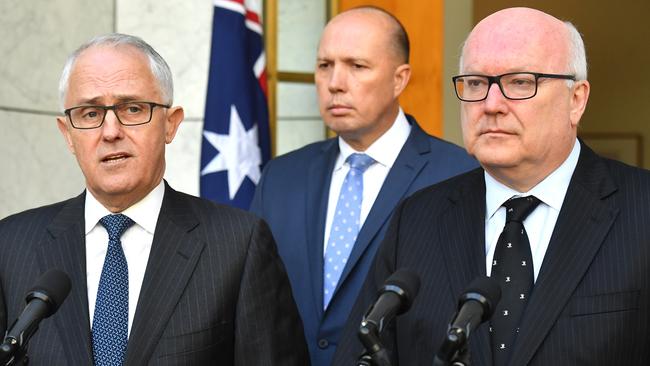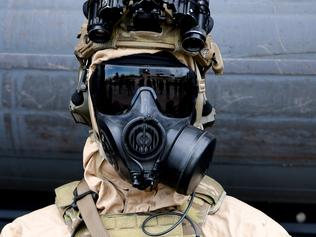Brandis weighs in to ASIO terror row
George Brandis has defended ASIO chief Duncan Lewis over his claim there were no links between refugees and terror.

Attorney-General George Brandis has defended ASIO director-general Duncan Lewis over comments claiming there were no links between refugees and terrorism as other senior cabinet ministers last night distanced themselves from the remarks.
Senator Brandis last night backed Mr Lewis, seeking to clarify his remarks to a Senate hearing last week, claiming the spy boss was referring to Australia’s refugee program not being the “source of the terrorism problem”.
In a statement to The Australian, Senator Brandis admitted a small number of refugees had been implicated in terrorist activities, but they were only a few of the many thousands of Middle Eastern refugees coming to Australia.
“Mr Lewis was asked about Middle Eastern refugees coming to Australia and bringing in the threat of terrorism,” Senator Brandis said. “The point he made is that Australia’s refugee program is not the source of the terrorism problem.
“Although a small number of Middle Eastern refugees have been implicated in terrorist activities, they are a tiny fraction of the many thousands of the Middle Eastern refugees Australia settles.
“Australia goes to great lengths to ensure that all candidates for refugee resettlement undergo very extensive character and security checks.
“The problem of Islamist terrorism, as Mr Lewis and other national security specialists recognise, has many causes — in particular the radicalisation of young people by terrorist recruiters.”
Pauline Hanson last night told 2GB she would pursue recalling Mr Lewis to the Senate, after he seemed to talk down links between refugees and terrorism during a Senate hearing.
“I was gobsmacked with the response I got from him, it’s not what the Australian people want to hear,” she said. “People are constantly ringing up my office, pulling me up in the streets because they’re in fear. They want some answers.”
Ministers including Peter Dutton and Arthur Sinodinos yesterday referred questions about Mr Lewis’s comments to Senator Brandis, as Coalition MPs expressed concern about the spy chief’s dismissive remarks.
“I have absolutely no evidence to suggest there’s a connection between refugees and terrorism,” Mr Lewis told the Senate hearing, under questioning from Senator Hanson.
As government MPs sought clarity yesterday over Mr Lewis’s comments, Senator Brandis told a Coalition MPs’ meeting he would organise a briefing from the ASIO boss, after concerns were raised about why Islamist group Hizb ut-Tahrir was not listed as a terror organisation.
A Liberal MP told The Australian yesterday that meeting with Mr Lewis would offer a chance for MPs to question the ASIO director-general about those views, while another Liberal said the remarks had not “properly articulated” the reality of the situation.
Tony Abbott this week publicly cautioned the domestic spy agency following Mr Lewis’s comments. The former prime minister said ASIO could not afford to lose the confidence of the public by pretending there was no “death to the infidel” strain within Islam. “Obviously ASIO has to have good relations with the Muslim community,” he said. “By the same token, (it) has to command the confidence of the Australian community. Nearly all of the terrorist incidents are associated with people yelling out Allahu Akbar as they kill.”
Mr Abbott was backed by Coalition colleagues including NSW Liberal MP Craig Kelly and Queensland Nationals MP George Christensen, who argued there were clear connections between the mass movement of refugees fleeing Middle East conflicts and the risk of terrorist incidents.
Malcolm Turnbull yesterday told his partyroom that last week’s Manchester Arena bombing, which killed 22 people including young children, was a reminder of the need for “constant vigilance” on security. The Prime Minister told the meeting Australia needed to “harden” its security infrastructure around places of mass gathering, an issue he said he had raised with state premiers, given concerns about vehicle attacks and other acts of terror.
He did not describe the concert bombing as Islamic terrorism, however, joining the Mayor of Manchester Andy Burnham, who said the attack was the act of a terrorist or extremist who did not represent the Muslim community “in any way, shape or form”. In several speeches and interviews about the bombing last week, Mr Turnbull condemned the attack without mentioning Islam.
Last year, the Prime Minister had hardened his language, blaming “radical Islamist ideology’’ for the majority of the world’s terrorist attacks. “In this age of terrorism — overwhelmingly inspired by radical Islamist ideology — our security agencies must have the trust of Islamic communities in order to succeed,’’ Mr Turnbull said. “This is why I choose my language carefully.’’
The MPs’ meeting with Mr Lewis was organised after Victorian Liberal Sarah Henderson called in the Coalition meeting for a debate on declaring Hizb ut-Tahrir a terrorist organisation.
She expressed concern at Hizb ut-Tahrir senior member Uthman Badar’s recent call for the death of “apostates”. Asked if he wanted to kill Muslims who left the faith, Uthman Badar allegedly replied: “In Islam it is clear that apostates do attract capital punishment — we don’t shy away from that.”
Ms Henderson said she had deep concerns about the group: “A terrorist organisation is defined as an organisation which directly or indirectly engages in preparing, planning, assisting or fostering the doing of a terrorist act, or advocating the conduct of a terrorist act.”
West Australian Liberal MP Andrew Hastie said he understood the case against banning the group, which argued that “if we strike the shepherd we can scatter the sheep” and make it harder to track terrorist activity.
Mr Hastie, who chairs the parliamentary joint committee on intelligence and security, said the subject should be debated, given the group’s activities. “They totally oppose everything we stand for yet we tolerate them in our midst.
“Listing it as a terrorist organisation is something we should discuss,” he said.
Senator Brandis said yesterday he had sought the professional advice of security agencies about the group on a number of occasions, including last week. It was the “strong view” of ASIO analysts that Hizb ut-Tahrir Australia, which describes itself as a “political party” on its website, did not fit the definition of a terrorist organisation in the criminal code.
Before a group is listed, the Attorney-General must be satisfied the organisation is “directly or indirectly engaged in preparing, planning, assisting or fostering the doing of a terrorist act, or advocates the doing of a terrorist act”.
There are 23 bodies listed as terrorist organisations in Australia. Hizb ut-Tahrir is banned as a terrorist group in Russia, The Netherlands and a number of Middle Eastern countries, and prohibited in Germany as an anti-Semitic group
Additional reporting: Joe Kelly








To join the conversation, please log in. Don't have an account? Register
Join the conversation, you are commenting as Logout